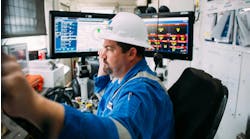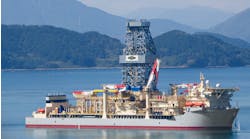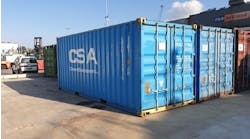Field development activity strong despite regional economic downturn
Despite the well-publicised economic difficulties that have afflicted countries in the region in the last year, Southeast Asia is still regarded as a prime area for promotion of equipment and services by British companies in the oil and gas supply sector.
These companies are poised to build business on the leading role which several UK exploration and production groups have taken in projects geared to meeting the region's long-term energy demands. This includes cross-border trade in natural gas which is expected to meet an increasing volume of local needs as growth in consumption resumes and plans for petrochemical investment go-ahead.
The Asia-Pacific region generally is regarded as an area of longer-term opportunity rather than being selected as a target market in which promotional activity could yield immediate results, according to the present priorities drawn up by the UK government's Infrastructure and Energy Project Directorate (IEP), which incorporates the former Offshore Supplies Office.
But while some projects are likely to remain on hold until there is a clearer indication of future economic trends, the IEP has identified specific areas of expertise which should be in demand as countries press ahead with essential energy investment programs.
IEP area export manager Karin Finegan said that opportunities existed for companies which could offer high-tech solutions to production challenges, particularly in Malaysia where Scottish Trade International recently organized a seminar to alert local companies to expertise developed for North Sea applications.
She said that, in general, the region offered scope for provision of all types of management services related to energy projects. There was also a need for assistance with setting up training schemes for local work forces and services to encourage best environmental practices.
Over the next year, IEP will run seminars in countries such as the Philippines and Thailand to focus on experiences in the management of maintenance services and safety which UK companies have accumulated over three decades in the demanding environment of the North Sea.
Project success
Among past successes, the Aberdeen-based Atlantic Power, in association with Salamis, won a contract to carry out maintenance in Brunei where Shell is the main operator. Under another recent deal, supported by Scottish Enterprise, help is being given to Vietnam in the setting up of a facility in which oil industry supply companies can share research resources using Aberdeen's Offshore Technology Park as a model for the development.Feedback from previous trade missions to the region has highlighted the need for other expertise in areas such as computer technology, corrosion and conditioning monitoring, enhanced recovery techniques, pipeline design and management and seismic services. There are also opportunities for downhole completion work and assistance with the installation of telecommunication systems.
The focus in not solely on greenfield developments. Malaysia has ageing facilities which are considered ripe for the application of enhanced recovery techniques. Assistance is also being sought with planning the eventual abandonment of facilities with the help of cost-reducing technologies which are in demand by operators throughout the region.
The IEP believes that the companies with the best prospect of making breakthroughs into the Asia-Pacific market are providers of advanced niche technologies rather than manufacturers of standard kit which are unlikely to succeed unless they can undercut the prices of present suppliers in offering high-quality products with superior after-sales service.
Indonesia
The involvement of leading UK upstream exploration companies in projects throughout the region could also work in favor of British suppliers with whom those operating groups are familiar in the home market, particularly companies which have adopted the cost-cutting culture from working within alliances to enhance project management performance.Among significant recent developments is progress in Indonesia made by BG, the international exploration and production company spun off from the former British Gas. The firm drilled the Mururi concession in Irian Jaya where the first Mogoi-deep well tested 40 MMcf/d of gas from several Permian zones in 1996.
Last year, BG agreed to collaborate with Arco, which has the neighboring Wiriagar and Berau production-sharing concessions, in the development of resources to supply gas for a proposed LNG project at Tangguh. After a recent assessment by DeGolyer & MacNaughton confirming the three blocks had sufficient reserves to support annual exports of up to 11.5 million tons for 25 years, efforts are being made to secure markets for the fuel in Japan, South Korea, and Taiwan.
Vietnam
Other developments in the region include Vietnam's largest gas project to date, which is planned by British Petroleum in an alliance with Statoil. It is based on the Lan Tay and Lan Do offshore fields in the Nam Con Son Basin.The companies are working with PetroVietnam and other government agencies on a scheme to develop production facilities and infrastructure which should give the country a significant economic boost by providing fuel for power generation and industrial use in the Ho Chi Minh city region.
After an appraisal program, combined reserves at the fields were estimated at 2 tcf. The development concept envisages the installation of twin platforms - one for dehydration equipment and quarters while the other would accommodate compression facilities pumping production into a 370-km, 24-in. pipeline to a shore terminal.
Both fields will be developed with subsea wells linked to the platforms by flowlines. Horizontal wellheads will be used to maximize the flow and minimize workover costs for up to six wells at Lan Tay and three wells drilled through a template at Lan Do, due to go on stream several years after production is achieved at Lan Tay.
The BP/Statoil project is one of Vietnam's top three strategic projects intended to create substantial benefits to the country which has been an area of considerable interest to international oil companies in recent years as first steps are taken to liberalize the economy after years of authoritarian control.
Estimates by the Vietnam authorities suggest that $5 billion of foreign investment will be needed in the upstream sector up to the year 2000. Plans are being made to offer unallocated offshore and onshore blocks to attract companies interested in exploration prospects.
Malaysia
In contrast to Vietnam, which is not one the UK's traditional markets for oil and gas supplies, the IEP believes that British companies have a number of natural advantages in trading with Malaysia. They include common language and historic links, similar education and legal systems and a similar business culture. The country has estimated oil reserves of about 5 billion bbl as well as gas reserves of more than 1.9 tcm.Although some of Malaysia's proposed gas and LNG projects may be delayed by the impact of the economic difficulties on markets in the region, the IEP expects considerable investment in both upstream and downstream projects over the next few years.
A recent estimated by Petronas, which operates both as state oil company and regulating body for the sector, suggested that 1998 upstream spending would total about $2 billion despite uncertainties about offshore projects linked to LNG schemes proposed by Occidental and Nippon Oil going ahead as quickly as planned.
With five refineries as well as two existing LNG plans with combined annual capacity of 16 million tons, total downstream investment in 1998 is expected to be even higher at $2.4 billion. Projects underway include a new acetic acid plant as a joint venture between BP and Petronas. Among other projects in which Petronas has stakes are an ethylene cracker being developed by Union Carbide and a base oil refinery in which Conoco and Statoil are partners.
According to IEP forecasts, total investment in Malaysia's oil, gas and petrochemical sector could reach nearly US$17 billion over the next five years. It is urging UK firms to obtain necessary authorizations from Petronas which has responsibility for approving sources of procurement as part of its regulatory functions.
Brunei
Although oil output from the former British colony of Brunei is small in global terms, it is the third largest producer in the region. It also delivers about 30 million cubic meters of LNG to Japan under a 20-year contract signed in 1993.With about 90% of all production based on offshore reserves, the IEP believes that expertise developed for the North Sea will be of relevance in Brunei, particularly as exploration moves to deeper waters.
Shell, which for many years was the only company involved in Brunei's oil sector, is still the main player, but other groups have made inroads recently, including Elf, which has made some significant offshore oil finds, and New Zealand's Fletcher Challenge.
Britain's Premier Oil is well advanced with plans to start production in early-2000 from the Yetagun offshore gas field discovered in an exploration concession negotiated in Myanmar. The drilling platform, for which the jacket was fabricated at the Nippon Steel yard at Batam Island in Indonesia, has already been installed to support eight wells.
The production platform is being fabricated at the Sembawang yard in Singapore and a contract for a floating storage and offtake vessel, capable of handling 50 million bbl of condensate from the field, has been placed with SBM Production Contractors.
Premier's activities in the Asia-Pacific region took a major step forward a few months ago with the signing of a contract for the transportation and sale of gas from the three West Natuna blocks in Indonesia in which the company is in partnership with Conoco and Gulf Indonesia. The deal was signed by Pertamina, Indonesia's state oil company, and the Sembec group of Singapore which plans to import 352 MMcf/d of gas for a 22-year period from 2001 for use in power generation as well as petrochemical feedstock and fuel oil replacement.
Other countries
- Singapore is the richest country in Southeast Asia in terms of per-capita income, despite having no oil or gas resources of its own. It is, however, an important trading hub for the region as a whole and provides a base for many offshore service providers. It also has a significant downstream sector with refineries operated by Shell, Esso, Mobil and a consortium led by BP.
The lack of indigenous offshore resources has not prevented local engineering companies diversifying into niche markets such as the construction of harsh weather jackups, floating production systems, and modules. The IEP believes that there is scope for UK firms with relevant experience to establish business links with Singapore contractors which have not only focused on markets in the Asia-Pacific region but also supplied other areas of the world, including the North Sea.
- Thailand is considered by the IEP as another market to watch for niche opportunities despite the slowdown caused by financial problems. This may mean energy demand failing to grow at levels previously forecast. But new onshore and offshore blocks have recently been offered to encourage further exploration and development activity in a country in which Shell, BG, Total, and Unocal are among international companies with an established presence.
- Shell is also among companies which have been involved recently in exploration in the Philippines where there is a need to replace declining output from the Nido and Matinlow fields which provide current oil production. Most recent finds have been in deepwater around Palawan.
Copyright 1998 Oil & Gas Journal. All Rights Reserved.


